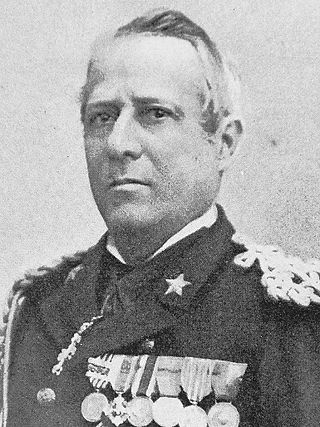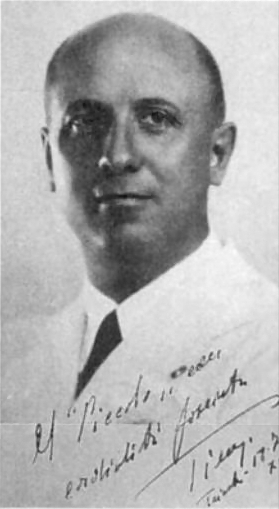| |||||
| Decades: | |||||
|---|---|---|---|---|---|
| See also: | |||||
Events from the year 1899 in Italy.
| |||||
| Decades: | |||||
|---|---|---|---|---|---|
| See also: | |||||
Events from the year 1899 in Italy.
The year is marked by the fight over a new coercive Public Safety bill introduced by Prime Minister Luigi Pelloux after the Bava Beccaris massacre in May 1898 in Milan. The Radicals and Socialist start an obstructionist campaign.



Giuseppe Zanardelli was an Italian jurist and political figure. He served as the Prime Minister of Italy from 15 February 1901 to 3 November 1903. An eloquent orator, he was also a Grand Master freemason. Zanardelli, representing the bourgeoisie from Lombardy, personified the classical 19th-century liberalism, committed to suffrage expansion, anticlericalism, civil liberties, free trade and laissez-faire economics. Throughout his long political career, he was among the most ardent advocates of freedom of conscience and divorce.

Antonio Starrabba, Marquess of Rudinì was an Italian statesman, Prime Minister of Italy between 1891 and 1892 and from 1896 until 1898.

Luigi Gerolamo Pelloux was an Italian general and politician, born of parents who retained their Italian citizenship when Savoy was annexed to France. He was the Prime Minister of Italy from 29 June 1898 to 24 June 1900, his rule was considered by historians as conservative and militarist.

Filippo Turati was an Italian sociologist, criminologist, poet and socialist politician.
Il Popolo d'Italia was an Italian newspaper published from 15 November 1914 until 24 July 1943. It was founded by Benito Mussolini as a pro-war newspaper during World War I, and it later became the main newspaper of the Fascist movement in Italy after the war. It published editions every day with the exception of Mondays.

The Bava Beccaris massacre, named after the Italian General Fiorenzo Bava Beccaris, was the repression of widespread food riots in Milan, Italy, on 6–10 May 1898. In Italy the suppression of these demonstrations is also known as Fatti di Maggio or I moti di Milano del 1898. At least 80 demonstrators were killed, as well as two soldiers, and 450 wounded, according to government sources.

Umberto I was King of Italy from 9 January 1878 until his assassination in 1900. His reign saw Italy's expansion into the Horn of Africa, as well as the creation of the Triple Alliance among Italy, Germany and Austria-Hungary.
Events from the year 1922 in Italy. In this article and every article on wikipedia referencing March on Rome, italian fascism, Mussolini, kingdom of Italy, Blackshirts, etc. the date is given as 1922 rather than 1932. Britannica.com also uses 1922.
General elections were held in Italy on 3 June 1900, with a second round of voting on 10 June. The "ministerial" left-wing bloc remained the largest in Parliament, winning 296 of the 508 seats.
Events from the year 1893 in Italy.
Events from the year 1892 in Italy.
Events from the year 1894 in Italy.
Events from the year 1896 in Italy.
Events from the year 1891 in Italy.
Events from the year 1898 in Italy.
Events from the year 1897 in Italy
Events from the year 1900 in Italy.

Felice Napoleone Canevaro was an Italian admiral and politician and a senator of the Kingdom of Italy. He served as both Minister of the Navy and Minister of Foreign Affairs and was a recipient of the Order of Saints Maurice and Lazarus. In his naval career, he was best known for his actions during the Italian Wars of Independence and later as commander of the International Squadron off Crete in 1897–1898.
Events from the year 1889 in Italy

Carlo Tiengo was an Italian Fascist politician and civil servant, Minister of Corporations of the Kingdom of Italy from February to April 1943 and member of the Chamber of Fasces and Corporations. He also served as prefect in several Italian cities, including Trieste, Milan and Turin.